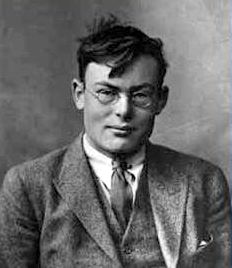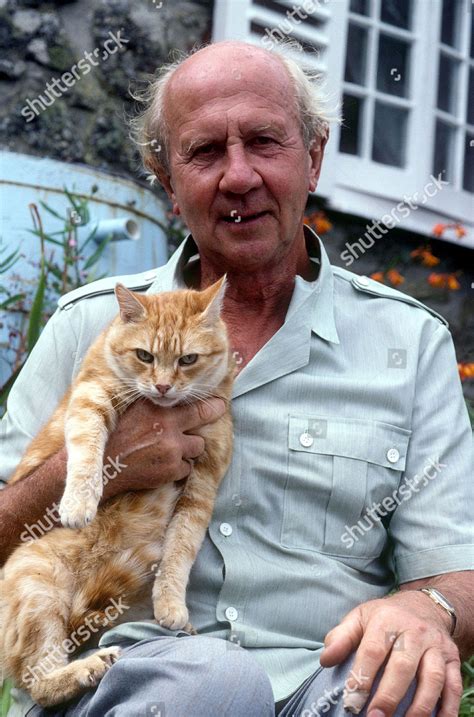A Quote by Frank P. Ramsey
My picture of the world is drawn in perspective and not like a model to scale. The foreground is occupied by human beings and the stars are all as small as three-penny bits. I don't really believe in astronomy, except as a complicated description of part of the course of human and possibly animal sensation. I apply my perspective not merely to space but also to time. In time the world will cool and everything will die; but that is a long time off still and its present value at compound discount is almost nothing.
Quote Topics
Almost
Also
Animal
Apply
Astronomy
Beings
Believe
Bits
Complicated
Compound
Cool
Course
Description
Die
Discount
Drawn
Everything
Except
Foreground
Human
Human Being
Human Beings
Like
Long
Long Time
Merely
Model
Model T
Nothing
Off
Part
Penny
Perspective
Picture
Possibly
Present
Really
Scale
Sensation
Small
Space
Stars
Still
Three
Time
Time Off
Value
Will
World
Related Quotes
And people who believe in God think God has put human beings on earth because they think human beings are the best animal, but human beings are just an animal and they will evolve into another animal, and that animal will be cleverer and it will put human beings into a zoo, like we put chimpanzees and gorillas into a zoo. Or human beings will all catch a disease and die out or they will make too much pollution and kill themselves, and then there will only be insects in the world and they will be the best animal.
Are there still other possibilities? Of course there are. What is important to recognize is that all three historical options are really there, and the choice will depend on our collective world behavior over the next fifty years. Whichever option is chosen, it will not be the end of history, but in a real sense its beginning. The human social world is still very young in cosmological time. In 2050 or 2100, when we look back at capitalist civilization, what will we think?
It is so important not to let ourselves off the hook or to become apathetic or cynical by telling ourselves that nothing works or makes a difference. Every day, light your small candle.... The inaction and actions of many human beings over a long time contributed to the crises our children face, and it is the action and struggle of many human beings over time that will solve them-with God's help. So every day, light your small candle.
But as Van casually directed the searchlight of backthought into that maze of the past where the mirror-lined narrow paths not only took different turns, but used different levels (as a mule-drawn cart passes under the arch of a viaduct along which a motor skims by), he found himself tackling, in still vague and idle fashion, the science that was to obsess his mature years - problems of space and time, space versus time, time-twisted space, space as time, time as space - and space breaking away from time, in the final tragic triumph of human cogitation: I am because I die.
In a few hundred years, when the history of our time will be written from a long-term perspective, it is likely that the most important event historians will see is not technology, not the Internet, not e-commerce. It is an unprecedented change in the human condition. For the first time - literally - substantial and rapidly growing numbers of people have choices. For the first time, they will have to manage themselves. And society is totally unprepared for it.
I believe it is quite possible for us to obtain an outer peace at the present time. Historically speaking, when human beings are faced with the choice between destruction and change, they are apt to choose change, and it's about the only thing that will make them choose change. So we have the possibility at the present time to take a different direction in the world - the possibility exists!
It's not given to human beings to have such talent that they can just know everything about everything all the time. But it is given to human beings who work hard at it - who look and sift the world for a mispriced bet - that they can occasionally find one. And the wise ones bet heavily when the world offers them that opportunity. They bet big when they have the odds. And the rest of the time they don't. It's just that simple.
When human beings lose their connection to nature, to heaven and earth, then they do not know how to nurture their environmect or how to rule their world - which is saying the same thing. Human beings destroy their ecology at the same time that they destroy one another. From that perspective, healing our society goes hand in hand with healing our personal, elemental connection with the phenomenal world.
Human beings look separate because you see them walking about separately. But then we are so made that we can see only the present moment. If we could see the past, then of course it would look different. For there was a time when every man was part of his mother, and (earlier still) part of his father as well, and when they were part of his grandparents. If you could see humanity spread out in time, as God sees it, it would look like one single growing thing--rather like a very complicated tree. Every individual would appear connected with every other.
I do not mind having imaginary conversations with animals who are part of my life. The comfort of talking to one at a time of personal distress is so soothing because one has the ease of knowing that one's secrets will not be repeated to anyone. Yet there are those who are horrified that an animal can be a more reliable part of one's world than that of the human world.
I believe that if we would carefully apply the distinction between transparency and opacity to the different layers of the human self-model, looking at self-consciousness in a much more careful and fine-grained manner, then we might also arrive at a new answer to your original question: What a "first-person perspective" really is.









































